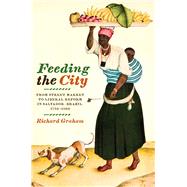Feeding the City
, by Graham, Richard- ISBN: 9780292723269 | 0292723261
- Cover: Paperback
- Copyright: 10/15/2010
On the eastern coast of Brazil, facing westward across a wide magnificent bay, lies Salvador, a major city in the Americas at the end of the eighteenth century. Those who distributed and sold food, from the poorest street vendors to the most prosperous traders-black and white, male and female, slave and free, Brazilian, Portuguese and African-were connected in tangled ways to each other and to practically everyone else in the city and are the subjects of this book. Food traders formed the city's most dynamic social component during the late eighteenth and early nineteenth centuries, constantly negotiating their social place. The boatmen who brought food to the city from across the bay decisively influenced the outcome of the war for Brazilian independence from Portugal by supplying the insurgents and not the colonial army. Richard Graham here shows for the first time that, far from being a city sharply and principally divided into two groups-the rich and powerful or the hapless poor or enslaved-Salvador had a population that included a great many who lived in between and moved up and down. The day-to-day behaviour of those engaged in food marketing leads to questions about the government's role in regulating the economy and thus to notions of justice and equity, questions that directly affected both food traders and the wider consuming public. Their voices significantly shaped the debate still going on between those who support economic liberalization and those who resist it.






